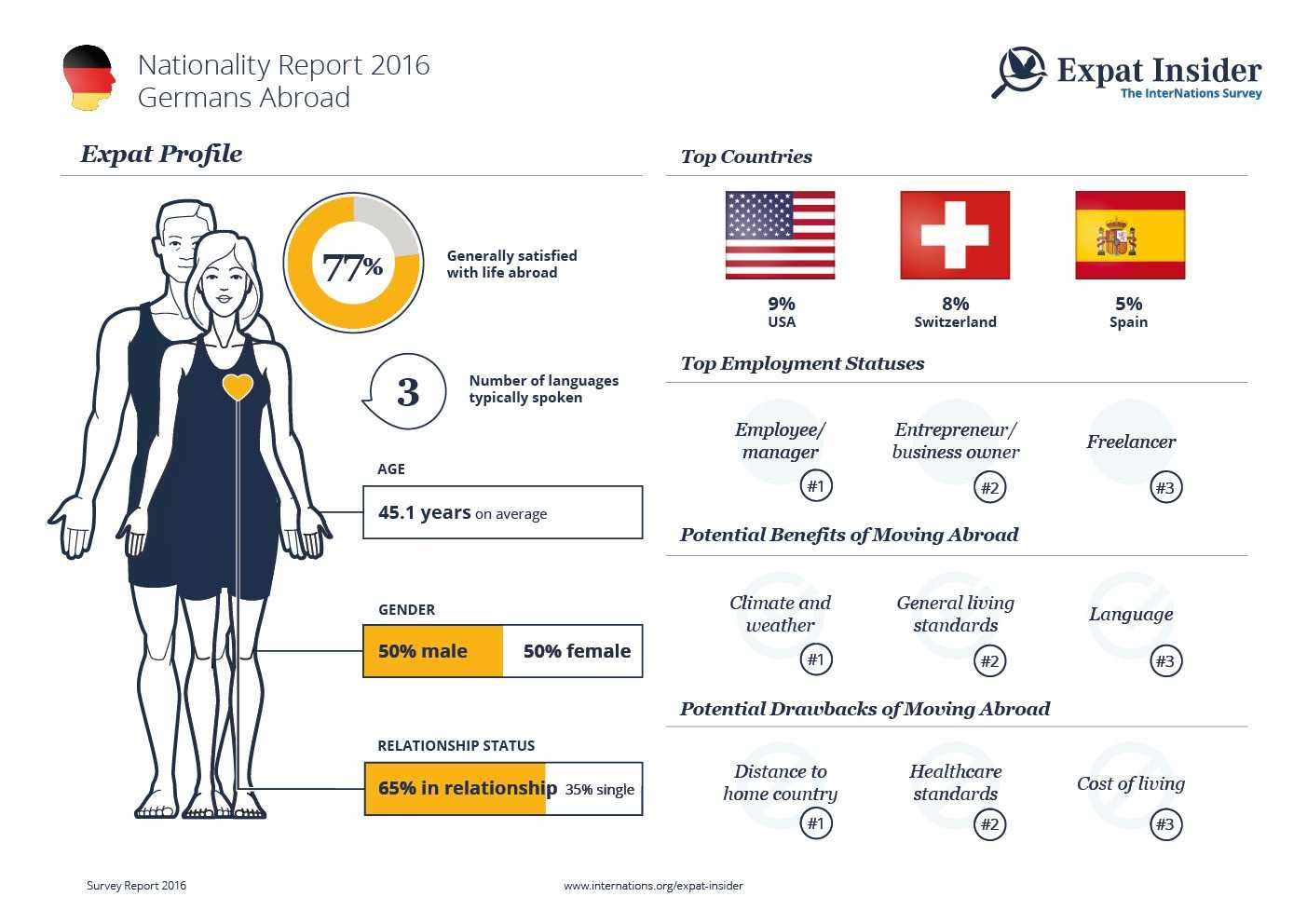Germans Abroad: For Work, Love & Adventure
Germans move abroad mainly for job-related reasons, speak multiple languages, and tend to live in their host countries for a long time.
- Germans like a good adventure
- They tend towards long stays abroad
- Many plan to stay in their host country forever
- About half speak the local language very well
Expat Statistics 2016

What Makes Germans Relocate?
While close to one in four of the German respondents (23%) cited looking for an adventure or a personal challenge as one of their reasons for relocating, most were in the end mainly motivated to move to their current host countries for work-related reasons. In fact, almost one-fifth (19%) cite being sent abroad by their employer as the most important reason, which is six percentage points more than the global average. One-seventh found a job abroad on their own (14%), and a group of romantics made up by 12% of the German respondents moved to live in their partner’s home country. Similarly, another 12% joined or followed their partner when they relocated for work or education.
Their own education or finances seem to be less of a motivation: only 3% of German expats say they moved abroad in order to go to school or university, which is half the global average of 6%. Similarly, just 2% quote financial reasons as their most important ones, compared to 4% worldwide. The destination country, on the other hand, has played a larger role in the decision making: 7% of Germans say their desire to live in a particular country was the main reason to go, a percentage that is beaten only by Israelis (15%) and is on par with US Americans (7%).
Staying in the Host Country Forever
The average age of the German respondents is 45.1 years, which is only slightly higher than the global average of 43.0 years. Regardless of age, two-sevenths (29%) say they have been living in their current country of residence for more than ten years already, followed by close to a fifth (19%) whose stay so far has lasted between five and ten years. Only one out of nine (11%) has been living in their country of residence for less than six months so far.
Expats’ plans reflect this tendency for longer stays as well: the largest group of Germans, made up of 34% of respondents, is planning to stay in their current country forever, if possible. Still, this does not mean that Germans abroad tend to stick to just one destination: while worldwide 27% say that their current experience is their first stay abroad, this is the case for not quite a sixth of German respondents (16%). Instead, 17% even say they have lived in five or more foreign countries so far, against a global average of 11%.
Speaking the Essential Languages
When living in multiple countries, good language skills can only be a boon. Close to two in five Germans (38%) say they speak three languages, including their mother tongue. A further 23% speak four languages and 16% even five or more, against 12% worldwide.
Indeed, 46% of Germans claim to speak the local language(s) of their respective country of residence very well, in contrast to the global average of 28%. One out of five speaks the local language a little and 18% speak it fairly well. Another one in ten even lives in a country where the local language is the same as their mother tongue. As a consequence, almost seven-tenths of the German respondents (69%) generally disagree that the language barrier is a problem for them.
Occupying Rather High Positions
Abroad, most Germans work as either employees or managers, making up half of the respondents. The second-largest group is 15% of Germans who work as entrepreneurs or own a business, while another 13% work as freelancers. The level of seniority among German employees or managers abroad is somewhat above average: almost two-sevenths (28%) are senior employees or experts and 45% work in management positions.
Despite the good positions as well as a good education — 54% have a Master’s degree or even a PhD, compared to 47% worldwide — Germans generally speaking do not earn much more for the same job abroad. In fact, 21% say they earn about the same, and even if 47% say their income is generally higher than it would be in Germany, this percentage is still lower than the global average of 54%.
Mixed Relationships Divided by Job Priorities
Most of the German respondents are in a relationship (65%). Interestingly, the percentages of the partner’s nationality are almost equally divided: 33% have a German partner, 35% are in a relationship with a national from their current country of residence, and almost one-third are with a person from another country (32%). The majority, made up by more than four-fifths (84%), lives in the same country as their partner, a percentage that matches the global average.
The unlucky ones who are in a long-distance relationship mainly cite work-related reasons for this. In fact, one-quarter live separately due to the lack of suitable jobs for both partners in the same country, while another 24% cite different career priorities. Almost one-fifth (19%) are living in different countries for family reasons.
Further Reading
Advertisement
Join InterNations
The community for expats worldwide
Download

